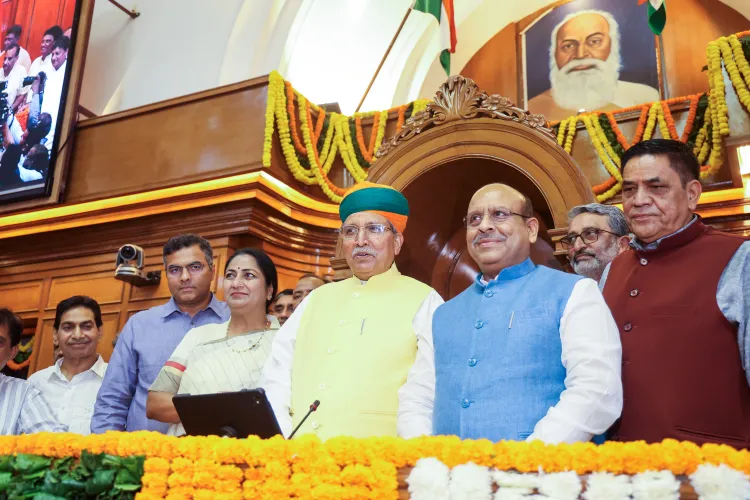What Did MoS Arjun Ram Meghwal Unveil at the Delhi Assembly?

Synopsis
Key Takeaways
- 500 KW solar power plant inaugurated at Delhi Assembly.
- First legislature in India to operate on solar energy.
- Launch of E-Vidhan application for a paperless legislative process.
- Projected savings of Rs 15 lakh monthly.
- Significant step towards sustainability and digital governance.
New Delhi, Aug 3 (NationPress) The Union Minister of State for Law and Justice, Arjun Ram Meghwal, officially launched a 500 KW rooftop solar power facility alongside the National e-Vidhan Application (NeVA) at the Delhi Assembly on Sunday.
Meghwal hailed these initiatives as significant strides towards environmental sustainability and digital governance, positioning the Delhi Assembly as the first legislative body in India to operate entirely on solar energy.
He highlighted that the Assembly's transition to solar energy sets a new standard for legislative bodies and public institutions across the nation.
Meghwal attributed this achievement to the visionary leadership of Prime Minister Narendra Modi and commended the Delhi legislature for embodying this transformation where sustainability, self-reliance, and digital empowerment converge.
The Minister noted that the implementation of NeVA at the Assembly, as part of the 'One Nation, One Application' initiative under Digital India 2.0, represents not just a technological upgrade, but a fundamental change in institutional values.
With full rollout anticipated during the Monsoon Session commencing on Monday, the Assembly will embrace a fully paperless operation.
He emphasized that this combination of climate responsibility and administrative reform must start within the core of democratic entities.
Meghwal assured that the Ministry of Parliamentary Affairs would extend all necessary support to the efforts and initiatives of the Delhi Legislative Assembly in this endeavor.
Speaker Vijender Gupta, addressing the audience, underscored that the solar plant is pivotal in a larger institutional transformation towards sustainability and digital progress.
Gupta stated, “The successful launch of the solar plant signifies a new era in our dedication to clean energy and public accountability. We take pride in leading by example and showcasing how legislative bodies can advocate for environmental stewardship.
He noted that the current Assembly building, established in 1912, was the site of the nation’s first Parliament — Desh ki pehli Sansad yahan thi.
Chief Minister Rekha Gupta, Deputy Speaker Mohan Singh Bisht, Minister of Public Works Parvesh Verma, and Minister of Power Ashish Sood were also present at the event.
This solar initiative is set to save up to Rs 15 lakh monthly — around Rs 1.75 crore annually — and is expected to recover its costs rapidly, potentially generating excess electricity through net metering.
The incorporation of the E-Vidhan platform further propels the Assembly's digital evolution by facilitating a paperless legislative process, thus enhancing administrative efficiency and significantly lowering the institution's carbon footprint, as per the Speaker.









